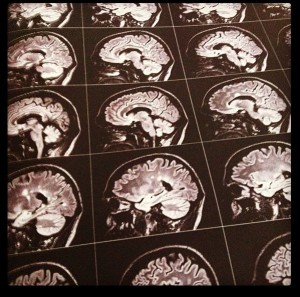Many studies show similarities between the symptoms of Vitamin B12 deficiency and multiple sclerosis (MS). There is also a very high rate of B12 deficiency among people diagnosed with MS. How, then, does one differentiate between pernicious anemia (vitamin B12 deficiency) and multiple sclerosis?
What is MS?
Multiple sclerosis is a disease that affects your central nervous system- your brain and spinal cord. It typically strikes young adults between the ages of 20-40, most of them women.
The exact cause of MS is unknown, but most scientists believe it is an autoimmune disorder. With multiple sclerosis, an autoimmune reaction attacks myelin, a fatty substance that insulates your nerve fibers responsible for transmitting messages to the rest of your body.
Signs of demyelination are random lesions, or plaques (sclerosis) in the brain and spinal cord, in multiple areas, thus the term “multiple sclerosis.”
What is B12 deficiency?
Vitamin B12 deficiency occurs when your body is unable to maintain sufficient stores of vitamin B12 (cobalamin) in the blood. There are several reasons this may happen, such as not eating food sources of vitamin B12 (meat, fish, and milk), or having a gastrointestinal disorder that interferes with vitamin B12 absorption.
With pernicious anemia (PA), your body cannot make intrinsic factor (IF), a protein necessary for digesting vitamin B12, due to an autoimmune disorder.
Among its many other benefits, vitamin B12 is essential for building up the fatty myelin sheath. One of the symptoms of PA is demyelination, the same type of brain damage that occurs with MS.
*Multiple sclerosis and vitamin B12 deficiency- pernicious anemia are both autoimmune disorders.
*Multiple sclerosis and vitamin B12 deficiency-pernicious anemia both involve damage to the nervous system’s myelin sheath.
What are the symptoms of multiple sclerosis?
The earliest symptoms of MS may include:
- Muscular weakness in one or more limbs
- Tingling or numbness
- Loss of balance
- Vision problems or eye pain
- Slurred speech
As the disease advances, symptoms worsen, including:
- Chronic fatigue, despite getting plenty of rest and not overexerting yourself
- Hypersensitivity to heat, such as hot showers or baths
- Muscular spasms in the legs and arms
- Bladder or bowel control problems
- Lightheadedness, or vertigo caused by nerve damage
- Cognitive impairment- “brain fog,” slowed thinking, lack of concentration, or memory loss
- Vision problems- blurring or graying of vision, or temporary blindness in one eye
- Painful “pins and needles” sensations, numbness, itching, or burning
- Speech and swallowing problems caused by damaged nerves
- Seizures
- Difficulty walking without stumbling, caused by muscle weakness, spasticity, or loss of balance from vertigo
- Paralysis
What are the symptoms of vitamin B12 deficiency?
The most common symptoms of B12 deficiency and pernicious anemia are:
- Chronic fatigue
- Depression
- Anxiety
- Paranoia
- Aggressive behavior
- Painful “pins and needles” or numbness in hands and feet
- Sore, swollen red tongue
- Burning mouth sensation
- Difficulty walking without stumbling
- Short-term memory loss
- Difficulty concentrating
- “Brain fog”
- Shortness of breath
*Multiple sclerosis and vitamin B12 deficiency-pernicious anemia both cause nerve damage, including painful tingling or numbness in the hands and feet and impaired gait.
*Multiple sclerosis and vitamin B12 deficiency-pernicious anemia both cause cognitive impairment, like brain fog, memory loss, and low concentration.
Which tests diagnose multiple sclerosis?
There is more than one test used to confirm MS, and your doctor will need to use the process of elimination to exclude other illnesses. Some common tests and indicators are:
- MRI scan indicating at least two incidences myelin damage- scar tissue (lesions)
- Neurological exams
- Blood tests
- Spinal tap
- Evoked potentials, an electrical test of your nervous impulses
Which tests diagnose vitamin B12 deficiency?
Only one test is required to diagnose vitamin B12 deficiency- a blood test indicating low blood serum levels of vitamin B12. Patients of pernicious anemia require routine blood tests in order to monitor their B12 levels.
What’s the best treatment for multiple sclerosis?
There is no cure for MS, but various medications are helpful for dealing with the symptoms.
- Some prescribed medicines work by controlling your body’s autoimmune response, thus reducing the frequency and severity of MS symptoms.
- Deep brain stimulation (DBS) is a controversial surgery used to treat debilitating tremors in people with MS. Complications may include paralysis, loss of vision, or loss of speech.
- Alternative medicine options that benefits MS patients include physical therapy, exercise like yoga or tai chi, acupuncture, aromatherapy, meditation, massage, and vitamin supplementation.
What’s the best treatment for vitamin B12 deficiency?
There are many kinds of B12 supplements on the market, but it’s important to be certain if you are able to digest vitamin B12 in the stomach. If you lack intrinsic factor, or if you’ve had gastrointestinal surgery like gastric bypass, then you will not benefit from dietary forms of vitamin B12.
- Physicians normally prescribe a series of B12 shots for patients with pernicious anemia. These vitamin B12 injections require a prescription, and not all health care providers cover extensive supplementation of vitamin B12 shots.
- Sublingual vitamin B12 pills that dissolve under the tongue are another option, although they are not very effective, and they often require dosages of three times per day.
Read more about vitamin B12 symptoms:
Vitamin B12 Deficiency- 4 Causes, 1 Solution
Absorbing Vitamin B12, a Metabolic Gastrointestinal Journey
Sore Burning Tongue, Dry Mouth, and Weird Tastes- What’s the Cause?
Sources:
Vitamin B12, demyelination, remyelination and repair in multiple sclerosis
WebMD Multiple Sclerosis Guide – Better Information for Better Health


